Best MEDICAL ALERT SYSTEMs IN 2024
Look at the best medical alert system on the market that offer excellent emergency assistance to you.
Best Overall
Best for Wide Range At Home System
Best Affordable System
Best for Caregiver Monitoring
Brio House is an independent review site. We may earn money when you click links inside our site.
The importance of medical alert systems is monumental. This is in particular for individuals with health conditions and seniors who want to live independently from their loved ones. Not only can medical alert systems get them help when needed, but these also allow them peace and security as they go about their day-to-day lives.
However, it is not as easy to pick the right medical alert system with so many options to choose from. The best medical alert system of 2024 is the Medical Guardian. It is the best overall system for those looking for the complete package. If you want to learn more click here.
The number of features they incorporate can be confusing for beginners, and some brands can even be misleading. Because of this, we have decided to test different medical alert systems available in the market and pick the best among the bunch.
Bottom Line:
Are medical alert systems worth it? Absolutely! If you have any hesitancy of how they can help you and your loved ones keep reading.

All of the brands included in this list were thoroughly researched and checked for their best qualities and their downsides. The goal of our professionals is to ensure that towards the end, customers can pick the right one based on their needs and preferences.
Not sure how all of this works? No problem! Click here if you want to know how do medical alert systems work. That guide will fill you in on all the details needed to understand the different technologies currently on the market and how they fit into your specific needs. If you are specifically looking for the best affordable medical alert systems in 2024 our experts have also researched those.
If you’re simply interested in how much do medical alert systems cost we can help there, too. It does range depending on your needs – but, our guide will remove any of the “sales jargon” that some companies use to confuse you.

Do Medical Alert System Work?
Yes, medical alert systems work by providing a quick and easy way for individuals to call for help in case of a medical emergency, especially for seniors or individuals with medical conditions. They have been shown to be effective in reducing response times and improving outcomes in emergency situations.
WHAT’S THE BEST MEDICAL ALERT SYSTEMS IN 2023
- Medical Guardian : Best Overall
- LifeFone : Best for Wide-Range At-Home System
- Bay Alarm Medical : Best Affordable System
- Aloe Care Health : Best for Caregiver Monitoring
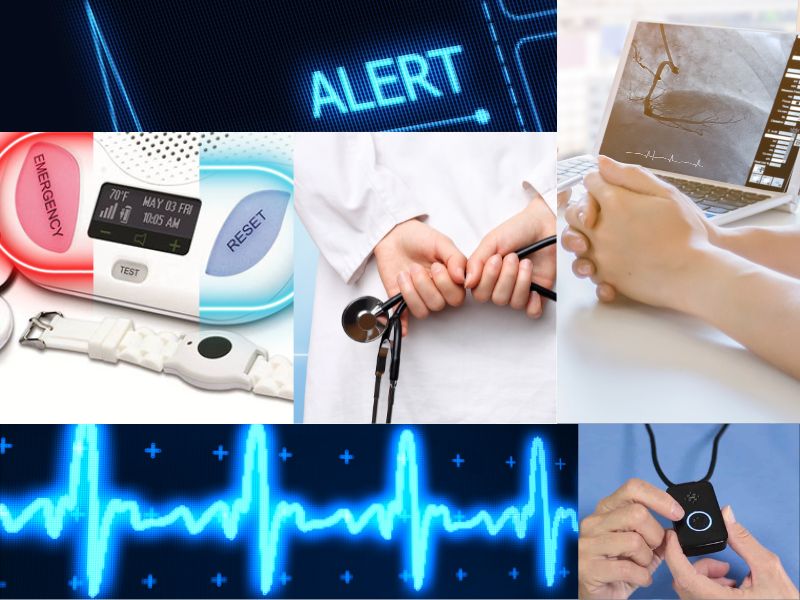
Reviews: The Best Medical Alert Systems In 2023
Here listed are the Best Medical Alert Systems you can have in 2024. All of the medical alert systems we’ve included are guaranteed leaders in the industry. They can be trusted not to fail you during medical emergencies and can provide you assurance as you go about your daily routine. While you may wonder can Apple watch be used as a medical alert – This list focuses on devices that are purpose built to keep your loved ones protected!
1. Medical Guardian : Best Overall
Best Overall
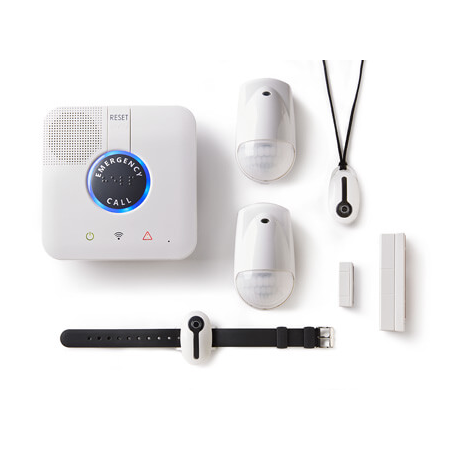
Medical Guardian
Our Rating:

5.0
Why choose it?
There are a number of reasons why Medical Guardian made it to our top pick of the best medical alert systems in 2023. But what makes it stand out is its lightning-fast response time, user-friendly devices, and a wide array of features that will not feel limiting to the users. Whether they are stay-at-home folks or one with an active lifestyle, there is a medical alert system available for them from Medical Guardian.
Medical Guardian also offers premium add-ons on top of their basic package. With a few additional bucks, customers can tailor-fit the medical alert system they will get from this brand. Users can easily ensure that they are well-taken care of at all times. This type of flexibility is not available from other medical alert companies.
Packages: Both the at-home and on-the-go setups of Medical Guardian have all the bells and whistles of a standard medical alert system – base station, two-way communication, water-resistant help buttons, etc. For the at-home setups, the help button has a range of 1300 to 1400 feet. Users can operate this system with both cellular and landline connections. There is even a backup battery that can last over 30 hours which is helpful during a power interruption. This alleviates any concerns of signal disruptions in case of an emergency.
But it is the on-the-go medical alert devices that really steal the show for Medical Guardian. They are specially made for users with an active lifestyle. Depending on the device users will get, they can last up to 7 days with their rechargeable batteries. Many users enjoy Mini Guardian the most because it is equipped with technology that can easily pinpoint the user’s exact location, wherever they are, in case of emergency.
Medical Guardian also offers the MGMove Smartwatch which, although straightforward and looks easy to use, boasts a sleek and sophisticated design. It easily blends in any OOTDs and no one will be the wiser that it is a medical alert device.
Extras: Medical Guardian offers everything their customer could ever ask for. Users can opt to add automatic fall detection and voice-activated wall buttons to their package. Users can get a lockbox that will securely hold their house key and will allow help to get to them with ease during an emergency. There is a feature that also sends real-time alerts whenever the help button is triggered. There’s the protection plan too, and an app specifically for your caregiver. Users can get the latter for free.
Pricing: With its outstanding offers, it doesn’t anymore come as a surprise that users will find the cost of Medical Guardian slightly higher than its competitors. The package for an at-home medical system starts at $30/mo, while the on-the-go equipment starts at $40. Users can expect to pay an upfront fee of $145 for the equipment, but there are packages with no equipment fee. The cost of add-ons varies per device and the least expensive one costs about $3/mo.
Users won’t have to worry about hidden charges and long-term contracts with Medical Guardian. To lighten the burden of the users, the brand also offers great deals all year round. Nevertheless, every penny is worth it, especially with the proven ultra-fast response of Medical Guardian in case of emergency.
Recommended Users: Medical Guardian is best suited for users with an active lifestyle and who love the great outdoors. It will benefit tech-savvy users who prefer the whole package and have a little more bucks to spare. It will be good for users who regularly provide well-being updates to their loved ones. Lastly, it will be best suited for users who want to have the assurance of medical alert systems but want to keep it on the down low.
PROS
CONS
Top Review
“Medical Guardian has been a total lifesaver for this busy bee. It’s perfect for my on-the-go lifestyle and gives me that added sense of security without being a bulky eyesore. Highly recommend it if you want to stay protected without sacrificing style.“
2. LifeFone : Best for Wide-Range At-Home System
Best for Wide-Range At-Home System
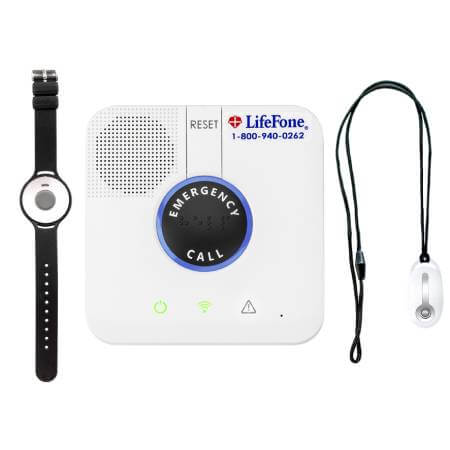
LifeFone
Our Rating:

4.7
Why choose it?
In getting a medical alert security system, one of the primary considerations will be the scope of the device. The wider the scope the better even if it is just within the user’s home. Who wouldn’t want help to be out of reach when it is needed the most?
For LifeFone, the range of in-house medical alert systems is not an issue. It offers up to 1,300 ft of coverage for both landline and cellular connection. This makes it possible for users to get help in case of emergency wherever they are in their homes. This is way better than what other brands offer. And that’s not all! LifeFone also goes out of its way to offer its users protection on the medical alert systems they will get. This brand is extremely customer-centric that they have gained the favor of loyal customers through the years.
Packages: LifeFone offers two at-home systems. Users have a choice between a landline and a cellular connection for the at-home system. Both have a base unit, a help button that can reach up to 1,300 ft, and a temperature sensor. Said sensor can trigger alerts to your listed contacts whenever the room temperature is not as it should be. Users will get an additional pill scheduler if they will get an at-home device with a cellular connection.
Mobile systems are also available for users with LifeFone. These come bundled with At-Home systems, keeping users well-supported in and out of their homes. At the minimum, users will get a wearable medical alert device – either a bracelet or pendant, a base unit, and a mobile device. The wearable pendant can also function as a communication device allowing users to provide updates to their loved ones. Choosing the At-Home & On-the-Go VIPx, users will get a location tracker, a caregiver app, and a device with a 16-day battery life that comes in 3 colors to choose from. This is beyond what other mobile medical alert devices in the market have!
Extras: Like many medical alert systems in this list, fall detection is not free for the packages LifeFone offers. It is optional and has an additional cost. But there is a whole lot more coverage for the VIPx because it can be used with AT&T and Verizon. Most mobile alert devices can only be used with AT&T.
LifeFone also closely monitors the battery life of its devices. It sends notifications to prompt users to charge their device when the battery is already low.
Pricing: LifeFone At-Home system with a landline connection is priced at $30/mo while the one that makes use of a cellular connection costs $35/mo. Mobile system bundles with At-Home system start at $40/mo. Users preferring to add the optional fall detection needs to pay an additional $5/mo. Other optional features include Activity Assurance and Daily Check-in Calls available at $6/mo and $19/mo, respectively.
What LifeFone has that users will really find valuable is how their services are centered on providing customer satisfaction. It doesn’t charge an equipment fee and provides a replacement for low-battery devices. Users can save a lot as they provide a price lock guarantee. There is also a referral program that will score old users a free month for new customers they can bring into the business. A limited lifetime guarantee is available for the medical alert devices the LifeFone offers and there is a 30-day money-back guarantee trial for users. LifeFone doesn’t have any hidden fees.
Recommended Users: With the wide coverage of the at-home system and the long battery life of the mobile system LifeFone has to offer, it is the best pick for users who want to be covered in and out of their homes. It is a good option for first-time users who want great discounts and customer protection. It will best suit users who are looking for an inexpensive fall detection capability and enjoy a lot of features in their medical alert devices. Lastly, it is a must-have for users whose loved ones always do a health status check.
PROS
CONS
Top Review
“Loving this top-notch medical alert system that always got my back 24/7 whether I’m at home or out and about. What I like the most is fall detection. I’ve got family members who like to keep tabs on my well-being (bless their hearts), and they’ll love the peace of mind it provides.“
3. Bay Alarm Medical : Best Affordable System
Best Affordable System
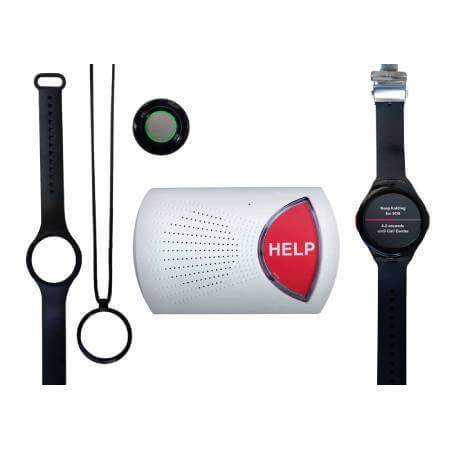
Bay Alarm Medical
Our Rating:

4.6
Why choose it?
Investing in a medical alert system doesn’t come cheap. Thus, it just makes sense that users would want to make the best out of every penny spent. With Bay Alarm Medical, users can easily reach this goal.
Bay Alarm Medical made medical alert systems attainable to every user with its affordable pricing. In most cases, lower prices usually mean below-par quality. But not with this brand. There may be just a few medical alert packages and add-ons to choose from, but what the brand has is outstanding and definitely does the job. This is the reason why Bay Alarm Medical has been consistently getting high ratings from satisfied customers on the Better Business Bureau (BBB) page. This is not an easy feat and it requires consistently high-quality services through the brand’s years of serving the industry’s needs.
Packages: Users can benefit from one at-home system and two mobile systems with ADT Health. The former comes with a landline connection that is upgradeable to a cellular connection. It includes a central hub and a wearable help button.
The two mobile systems are the SOS Mobile and the SOS Smartwatch. Both are equipped with location trackers. What makes the smartwatch a must-have is the step tracker which allows fitness-conscious users to keep track of how much distance they cover daily. It even has the means to contact the monitoring center when needed. It also looks sleek and low-key for those who want to keep their mobile medical device away from prying eyes.
Extras: Fall detection capability is available at an additional cost. This is compatible with both the at-home and on-the-go systems. Additional wall buttons are possible at an added cost.
Pricing: Bay Alarm Medical provides users with an at-home medical alert system for as low as $25/mo. Users will need to pay an additional $7/mo if they want a cellular connection. Mobile systems, on the other hand, start at $32/mo. If users prefer to get the smartwatch, then it will cost $35/mo. Optional fall detection is at an additional cost of $10/mo.
Users will get a discounted price if they get at-home and mobile systems together. This is an efficient option if they prefer all-around coverage. With Bay Alarm Medical, it is easy to have hundreds of dollars in savings a month. It also offers a price lock guarantee and a risk-free trial for 30 days.
Recommended Users: Bay Alarm Medical is the best choice for users with a limited budget that are looking for both at-home and on-the-go medical systems. It is also best for users who keep track of their fitness routine and want to stay under the radar with their medical device. Especially with the SOS Smartwatch, it will seem like users are just using a regular smartwatch.
PROS
CONS
Top Review
“The SOS Smartwatch is a game-changer for those of us who want a medical device that doesn’t break the bank or look like a hospital accessory. It’s super stylish, easy to navigate, and gives me that extra peace of mind whether I’m hitting the home gym or hitting the town. Highly recommend it if you want to stay safe and stylish at the same time!“
4. Aloe Care Health : Best for Caregiver Monitoring
Best for Caregiver Monitoring
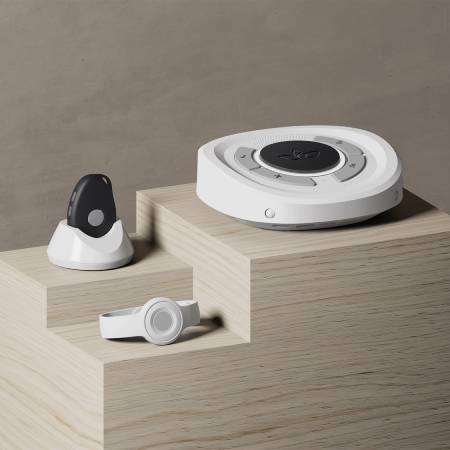
Aloe Care Health
Our Rating:

4.7
Why choose it?
Aloe Care Health may be a new brand in the industry but it is fast gaining popularity because of its smart features. With its outstanding caregiver App, we cannot help but think that it is made to assure caregivers and loved ones of the user’s well-being 24/7 without being too intrusive.
What’s unique about Aloe Care Health is it doesn’t just function as a trigger for emergency responders, but it also serves as a means of communication to anyone in the user’s contact list with the use of voice command. This applies even if the reason behind the call is not an emergency. This makes it easier for users to provide updates to their loved ones anytime. So far, this is the only medical alert system tested that has this feature.
Packages: Aloe Care Health offers three at-home medical alert packages – Essentials, Essentials Plus, and Total Package. All three are equipped with a smart hub and a help button. With the Essential Plus, users can get an additional Mobile Companion. The Total Care package, on the other hand, allows users to get additional motion sensors and a fall detection device on top of the Mobile Companion which is an on-the-go device. Mobile Companion comes with a built-in location tracker and fall detection.
Users will find having the motion sensors of the Total Care package useful because their capabilities extend to monitoring the air quality and temperature in the user’s home. The separate fall detection device in this package is likewise, a must to have. Unlike those wearable ones offered by competitors, this is instead mounted. The advantage is it can monitor a possible fall even from a distance. It is best to install it inside the bathroom as it is an accident-prone area.
Extras: Aloe Care Health makes their Caregiver app available at no additional cost. This makes it easier for loved ones connected to the app to keep an eye on the health condition of the user from afar and be alerted when there is an emergency situation. Further, the app also enables those linked to it to contact the monitoring professionals in case they think something is amiss with the user.
Pricing: Users should prepare to shell out anywhere between $150 to $350 for the upfront device cost if they want to get Aloe Care Health. The cost depends on the package they prefer. Getting the basic package will cost them $30/mo. Essential Plus and Total Care packages cost $40/mo and $50/mo, respectively. Getting The Mobile Companion separately, users will need to pay $25/mo. This doesn’t include the fee for equipment which can cost up to $150.
Users would be glad to know that they can get a 30-day trial period with Aloe Care Health – money-back guarantee! They also won’t even need to deal with the hassle of long-term contracts. Add decent professional response time to the deal and it’s a definite win with Aloe Care Health.
Recommended Users: Aloe Care Health’s medical alert system will best benefit users who mostly stay at home. It may not be a choice for users who are conscious of the range of their medical alert system. However, it will be a good pick for users with vision impairment, limited mobility, and seniors because of the voice command feature. It is also best for tech-savvy users, and users who want to frequently connect and update their loved ones on their health status.
PROS
CONS
Top Review
“I have aging parents with limited mobility and vision impairment and the Aloe Care Health’s medical alert system has been a game-changer. The voice command feature allows my parents to easily call for help even when they can’t reach the device, and the option for frequent updates means I can check in on their health status without constantly calling or visiting. Highly recommend it to anyone in a similar situation.“
5. ADT Health : Best Straightforward System
Best Straightforward System
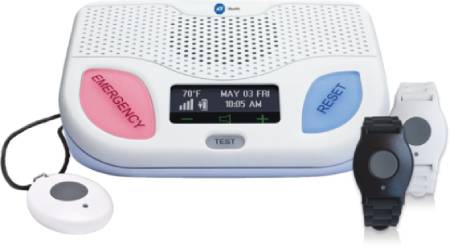
ADT Health
Our Rating:

4.6
Why choose it?
Many will recognize the brand ADT as a household name for home security systems. How can it be not, when it has been providing customers only with excellent equipment and trustworthy customer service for over a century and a half. With this many years of experience in their portfolio, it is hard to overlook the medical alert system they offer. Most especially since this can provide added value to any user’s household bundled with home security systems the brand also has.
At a glance, ADT Health doesn’t really stand out from competitors. It is equipped with pretty much the standard features of a basic medical alert system. But that makes this somewhat the best choice, especially for users who do not want to deal with complicated devices. It is straightforward and easy to use. But it provides lasting medical alert devices.
Packages: There are only 3 options available for users with ADT Health: Medical Alert Basic, Medical Alert Plus, and the On-the-Go. The first two are at-home systems, while the last one is the mobile system.
The Basic system makes use of the landline connection where users can get a base unit and a help button. Medical Alert Plus makes use of a cellular connection. With this package, users can get the equipment in the Basic system with the additional temperature-monitoring feature. The On-the-Go system comes with a help button and a device charger. It is equipped with a location tracker and a two-way communication feature. Basic and Alert Plus have a range of 300 and 600 feet, respectively.
Extras: Users will need to pay an additional cost for fall detection which is a must-have for every medical alert device. This is compatible only with Medical Alert Plus and On-the-Go. Other add-ons include a lockbox, an additional wearable help button, and a waterproof wall button which can be best installed in the bathroom.
Pricing: Users on a budget will be happy to know that the Basic package from ADT Health will only cost them $30/mo. The most expensive monthly package (excluding add-ons) will be the mobile system at $40, while Medical Alert Plus costs $36.
For users who want fall detection for their ADT Health, expect to pay an additional $10/mo. There is a one-time fee of about $30 for a lock box and an additional wearable help button costs about $15. A waterproof wall button is available at around $3/mo.
One good thing about ADT Health is they are not going to take advantage of the users’ money. It doesn’t have hidden fees and extra costs for medical alert packages including the shipping fee. It doesn’t even charge equipment fees and offers a price lock guarantee. Replacement batteries are free, and so is the Shipping of returned items. Deals are also available for users who already have the ADT Security system installed in their homes. Not to mention, monitoring is done by well-trained professionals and they have a fast response time.
Recommended Users: ADT Health is for users on a budget. It is also the best option for users who don’t want to deal with ultra-complicated devices and gazillion medical alert packages to choose from.
PROS
CONS
Top Review
“They have packages that make it easy to choose the right system for my needs. No hidden fees, equipment fees, and free shipping for returns as well as free replacement batteries are my major considerations to go with ADT Health. Furthermore, the discounts available for ADT Home Security system users make it an even more attractive option.”
6. Medical Alert : Best for Programmable Fall Detection
Best for Programmable Fall Detection
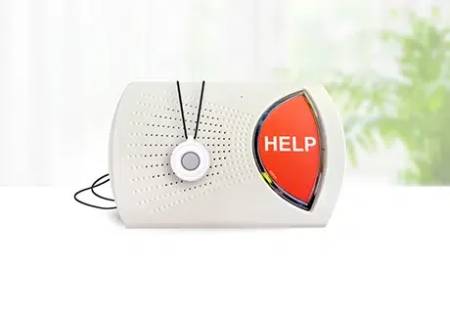
Medical Alert
Our Rating:

4.5
Why choose it?
Medical alert systems often have devices that can be bulky to carry. Because of optional add-ons, there are even times when the users have to carry more than one device to ensure that they are thoroughly covered. For those who want to be low-key on their medical alert device, sometimes they opt to just do away with an important add-on that compromises their well-being in emergencies.
Medical Alert makes the lives of its users a lot easier by ensuring that they have a medical alert that can do it all. With this brand, users won’t need to carry an additional device just for fall detection because this can be incorporated already into their mobile device. But convenience does not even touch the limit of what this brand can offer. It also has one of the most powerful apps for medical alert systems. It offers a slew of features including caregiver monitoring that, although enables loved ones to watch over the user’s health status, doesn’t feel intrusive.
Packages: Medical Alert offers both At-Home and Mobile systems. For At-Home systems, users have the option to choose from either a cellular or a landline connection. It includes a help button and has a scope of up to 800 ft. It has a backup battery that lasts up to two days.
For users that are on the go, Medical Alert has a mobile system powered by GPS tracking. The mobile device doubles as a communication device to reach the monitoring hub in case of emergency. The help button it comes with enables 24/7 support from Medical Alert professionals.
Extras: Medical Alert allows users access to their caregiver app at no additional cost. With this app, linked loved ones can easily locate the user. It also has the capability to send notifications to them whenever the emergency button is triggered and enables them to contact emergency services on behalf of the user. Other features of the app include call history monitoring and recording an emergency contacts list.
Fall detection is optional for an at-home system and can be programmed for Medical Alert mobile devices.
Pricing: At $28/mo, users can easily get the at-home system of Medical Alert with a landline connection. The one with a cellular connection costs a little more at $38/mo. Starting price of the mobile medical alert system is $48/mo, while fall detection costs $10/mo. There is also a $79 programming fee (one time) for all systems.
At first glance, it would seem like users will be paying extra for the mobile system. But due to its convenience and features, the price is just reasonable in the long run. Users can get a 30-day trial period with Medical Alert. Monthly plans are available but users can save more when they subscribe to an annual plan.
Recommended Users: Medical Alert offers a mobile medical alert system that will be good for users who hate bulky devices. It will also benefit those with loved ones who regularly do a well-being check on the user and who want to be notified immediately during emergency cases. Users who want the assurance of being able to contact emergency help from the device will also be happy to have the medical systems from Medical Alert.
PROS
CONS
Top Review
“I like the powerful caregiver app, real-time alert to the linked contacts of the user in case of emergency, and the mobile medical alert device with built-in fall detection. The device that doubles as a communication channel to Medical Alert professionals is also a major plus, as is the lack of long-term contract and the availability of a 30-day trial period.”
7. GetSafe : Best for No-Need to-Wear Help Button
Best for No-Need to-Wear Help Button
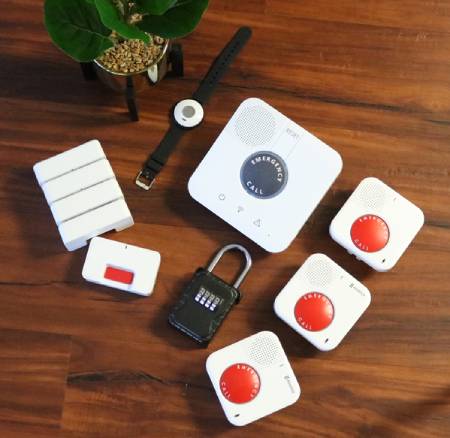
GetSafe
Our Rating:

4.6
Why choose it?
A medical alert device is helpful but sometimes can be tasking to carry with you. Not only can it feel irritating to wear it all the time, but wearable devices are pretty easy to lose too because of how small they are. This happens even in the comfort of your home which poses risk in case of an emergency.
It’s a good thing that GetSafe offers users at-home medical alert systems that work even without wearables. What users get instead are voice-activated wall buttons that they can strategically place in frequently used places inside their homes and those that are accident prone such as the bathroom. Aside from pushing the cord, calls for help can be triggered by commanding the device to “call 911” and by pulling the accompanying cord. The system works as effectively as those with wearable devices without the hassle of wearing one.
Packages: GetSafe offers different At-Home packages depending on the size of the user’s home: Started, Standard, and Select. All of them include a base unit and a complimentary wearable button. They also make use of cellular connections only.
The difference between the three is the number of wall buttons incorporated for each package. The basic package, Started, includes only one wall-mounted button. Standard includes two. Select offers a total of five: three wall-mounted and two regular wall buttons.
GetSafe offers wearable devices when users need to run errands outside their homes. This functions with a location tracker.
Extras: Users have a choice to purchase as many wall-mounted buttons as they want in addition to what was already provided in the package. Despite not requiring either a medical alert bracelet or pendant, a GetSafe package still includes a waterproof lanyard button that has a 5-year battery life.
Like in most cases, fall detection is optional and will cost users a few more bucks. This is a must-have since wall buttons do not have fall detection capability. The fall detection GetSafe offers can reach up to 800 ft from the central hub.
GetSafe ranks behind in terms of response rate.
Pricing: GetSafe charges a flat rate of $30/mo monitoring fee for its at-home medical alert systems regardless of the package and the number of buttons included. The downside is users are required to pay an upfront equipment cost that can be as low as $79 for one voice-activate wall button and can be as high as $279 for the Select package. On top of that, every button a user will purchase in addition to the one included in its pre-set packages will mean another fee. This is not cheap and is known to cost a lot depending on the device.
The on-the-go device from GetSafe costs about $20/mo for the monitoring and about $100 for the equipment. Fall detection costs an additional $10/mo. The latter can include location tracking. Other paid add-ons include a caregiver app that allows the location tracking of the user ($5/mo), a lockbox ($30 one-time fee), and device protection ($5/mo). Users can give GetSafe ago for 30 days without commitments.
Recommended Users: Because of how the GetSafe at-Home system is set up, it may be ideal for users who are frequently at home. It is not recommended to users that live in mansions and big houses because of how expensive the equipment can be. It is a system to consider for users who feel uncomfortable wearing medical alert devices. It is also recommended for users with vision impairment and mobility issues because it is voice-activated.
PROS
CONS
Top Review
“I highly recommend this medical alert system to anyone. The voice-activated feature and multiple ways to trigger assistance make it easy and efficient to use. The low monthly fees and optional wearable device make it affordable and customizable to your needs. Perfect for me!”
Frequently Asked Questions:
What is the number one medical alert system?
The top medical alert systems can vary depending on the needs and preferences of a user, and based on the criteria that will be considered. Our choice for best overall will be the Medical Guardian because it ranks high based on the features it offers, the available selections for its medical alert systems, coverage, design, and response time. It can cost significantly higher than those being offered by competitor brands but it provides thorough support to users who need it.
Which medical alert does AARP recommend?
AARP encourages the use of medical alert systems but it doesn’t endorse any specific brand for customer use. They leave it up to the user to get the medical alert system that would best fit their needs.
Does Medicare pay for any Life Alert systems?
Government-sponsored Medicare plans are not known to include medical alert systems in their coverage. There may be a type of Medicare plan that does but to be sure, this should be consulted with professionals before proceeding to buy one.
Who is the best medical alert company?
Different medical alert companies offer different systems that set them apart from each other. There is no single best medical alert system but there are certain companies that stand out based on the features available. In this list, enumerated are some companies with the best offers.
HOW DO MEDICAL ALERT SYSTEMS WORK?
A medical alert system works by providing you with a device such as a button or pendant that you can push during an emergency. Once pressed, an emergency service such as 911 or a loved one is contacted immediately.
Conclusion on Best MEDICAL ALERT SYSTEMs
The best medical alert systems are those that provide reliable and efficient emergency response services to individuals who require immediate medical attention. These systems should be easy to use, have a range of features and options that can be tailored to the user’s needs, and offer quick and responsive customer support.
Based on these criteria, some of the top medical alert systems on the market today include Medical Guardian, LifeFone, Bay Alarm Medical, and Aloe Care Health. These companies have built a reputation for providing high-quality services and products, and they offer a range of plans and pricing options to meet the needs and budgets of their customers.
Everyone has a different budget so if you are interested in how to get a medical alert bracelet for free there are some ways that you can do that. You may also want to check with your insurance as all plans are different. If you want to know does United Healthcare cover medical alert systems we have done research on that specific provider.
When choosing a medical alert system, it’s important to consider the specific needs of the user, including their level of mobility, medical conditions, and lifestyle. By taking the time to explore our research and compare different options, you can find the best medical alert system that will provide you or members of the family with the peace of mind and security they need to live independently and safely.
